#AWS Course
Explore tagged Tumblr posts
Text
https://deepdivein.wordpress.com/aws-f5-bigip-courses-udemy/
#AWS_AIF_C01_EXAM_PREPARATION_UDEMY#F5_GTM_EXAM_PREPARATION_UDEMY#F5_ASM_EXAM_PREPARATION_UDEMY#F5_101_EXAM_PREPARATION_UDEMY#F5_TMOS_EXAM_PREPARATION_UDEMY#F5_LTM_COURSE_UDEMY#F5_TMOS_COURSE_UDEMY#F5_101_COURSE_UDEMY Hurry Up !Limited Time!
2 notes
·
View notes
Text


















🤝Hand holding support is available with 100% passing assurance🎯 📣Please let me know if you or any of your contacts need any certificate📣 📝or training to get better job opportunities or promotion in current job📝 📲𝗖𝗼𝗻𝘁𝗮𝗰𝘁 𝗨𝘀 : Interested people can whatsapp me directly ✅WhatsApp :- https://wa.aisensy.com/uemtSK 💯Proxy available with 100% passing guarantee.📌 🎀 FIRST PASS AND THAN PAY 🎀 ISC2 : CISSP & CCSP Cisco- CCNA, CCNP, Specialty ITILv4 CompTIA - All exams Google-Google Cloud Associate & Google Cloud Professional People Cert- ITILv4 PMI-PMP, PMI-ACP, PMI-PBA, PMI-CAPM, PMI-RMP, etc. EC Counsil-CEH,CHFI AWS- Associate, Professional, Specialty Juniper- Associate, Professional, Specialty Oracle - All exams Microsoft - All exams SAFe- All exams Scrum- All Exams Azure & many more… 📲𝗖𝗼𝗻𝘁𝗮𝗰𝘁 𝗨𝘀 : Interested people can whatsapp me directly ✅WhatsApp :- https://wa.aisensy.com/uemtSK
#ccna#ccnatraining#ccnacertification#cisco ccna#awscloud#aws course#devops#cybersecurity#salesforce#pmp certification#pmp training#pmp course#pmp exam
1 note
·
View note
Text
The Power of AWS: Exploring the Foundations of Cloud Dominance
In the ever-evolving realm of technology, Amazon Web Services (AWS) has emerged as a titan, a driving force in the field of cloud computing. It's not merely a matter of how good AWS is; it's a testimonial to its exceptional prowess. AWS has completely changed the way businesses operate, offering a wide range of cloud services that empower companies to scale, innovate, and secure their digital infrastructure with unmatched efficiency.

AWS represents not just a cloud service provider but an entirely new era in technology. Its unparalleled scalability allows businesses to modify resources swiftly, responding to the ever-changing demands of the digital landscape with agility and cost-effectiveness. Security is non-negotiable, and AWS has fortified its fortress with a comprehensive suite of features and certifications to ensure that data remains protected from potential threats.
The pay-as-you-go model introduced by AWS is nothing short of revolutionary. It's a concept that makes cost-efficiency not just an aspiration but a practical reality. AWS's extensive service catalog addresses every facet of IT needs, providing the right tools for every job. But what sets AWS apart from the competition is its unwavering commitment to innovation. AWS is not content to rest on its laurels; it is a pioneer at the forefront of technological advancement. With a constant stream of new services and features, AWS ensures that businesses remain at the cutting edge of technology, fostering growth and innovation.
When it comes to cloud computing, Amazon Web Services (AWS) doesn't just excel; it sets the bar exceptionally high. AWS has rightfully earned its reputation as a global leader and trailblazer in cloud services, transforming the way organizations operate and innovate in the digital age. Here's why AWS isn't just good; it's exceptional:
The Pillars of AWS Excellence:
In the vast universe of cloud computing, Amazon Web Services (AWS) stands tall, a colossus that shapes the digital landscape. AWS is not merely exceptional; it's extraordinary, a testament to innovation, versatility, and unwavering commitment. Let's delve into the six pillars that set AWS apart, making it a juggernaut in the world of cloud services.
1. Unparalleled Scalability: AWS doesn't just scale; it transforms the very definition of scalability. Its unique ability to adapt to the ever-shifting needs of businesses, whether scaling resources up or down, is a transformative game-changer. This unparalleled flexibility empowers enterprises to tackle fluctuating workloads with unbridled agility and cost-effectiveness. It's not just a cloud service; it's a dynamic force that keeps businesses one step ahead.
2. Robust Security: In the realm of AWS, data security isn't just a priority; it's an obsession. AWS takes data protection to an entirely new level. With a comprehensive suite of security features, compliance certifications, and rigorous protocols, AWS builds an impregnable fortress around your data, safeguarding it from any potential threats. In the digital age, where data is the lifeblood of business, AWS ensures it flows securely.
3. Cost-Efficiency: Budgets are the lifeblood of any organization, and AWS understands that. Its pay-as-you-go model is a financial revelation, making cost-efficiency not just a goal but a reality. With this model, you pay only for the resources you actively use, avoiding unnecessary financial burdens. AWS is not just an asset; it's a financial ally that helps organizations optimize their resources.
4. Astounding Versatility: Imagine a one-stop-shop for all your IT needs. That's AWS. Its service catalog is not just extensive; it's astounding. From storage and databases to machine learning and analytics, AWS offers a plethora of tools that cater to every facet of IT. This versatility ensures that no matter the task at hand, AWS provides the right tools to get the job done.
5. Unwavering Reliability: Downtime is a digital nightmare, and AWS is your insurance against it. With a global network of data centers, AWS guarantees high availability and unwavering reliability for your applications and data. Downtime is a rare visitor in the world of AWS, and you can trust it to keep your systems up and running, day in and day out.
6. Commitment to Innovation: AWS isn't just a platform; it's a continuous journey into innovation. It refuses to rest on its laurels. Instead, AWS stands at the forefront of technological advancement. It's a trailblazer, a pioneer that consistently introduces new services and features. This proactive approach ensures that businesses stay ahead of the curve, harnessing the latest technology to fuel their growth. AWS is not just a cloud service; it's a driving force behind digital evolution.

If you're contemplating a career in the dynamic world of AWS, look no further than ACTE Technologies. Their comprehensive AWS training programs are meticulously designed to equip you with the skills, expertise, and hands-on experience needed to navigate the complexities of cloud computing. With ACTE Technologies as your guide, you can embark on a journey that not only unlocks the full potential of AWS but also promises a successful and fulfilling career in this ever-evolving field. AWS is not just good; it's outstanding, and ACTE Technologies is your partner in reaching for the clouds.
8 notes
·
View notes
Text
Best Data Science Courses Online - Skillsquad
Why is data science important?
Information science is significant on the grounds that it consolidates instruments, techniques, and innovation to create importance from information. Current associations are immersed with information; there is a multiplication of gadgets that can naturally gather and store data. Online frameworks and installment gateways catch more information in the fields of web based business, medication, finance, and each and every part of human existence. We have text, sound, video, and picture information accessible in huge amounts.
Best future of data science with Skillsquad
Man-made consciousness and AI advancements have made information handling quicker and more effective. Industry request has made a biological system of courses, degrees, and occupation positions inside the field of information science. As a result of the cross-practical range of abilities and skill required, information science shows solid extended development throughout the next few decades.
What is data science used for?
Data science is used in four main ways:
1. Descriptive analysis
2. Diagnostic analysis
3. Predictive analysis
4. Prescriptive analysis
1. Descriptive analysis: -
Distinct examination looks at information to acquire experiences into what occurred or what's going on in the information climate. It is portrayed by information representations, for example, pie diagrams, bar outlines, line charts, tables, or created accounts. For instance, a flight booking administration might record information like the quantity of tickets booked every day. Graphic investigation will uncover booking spikes, booking ruts, and high-performing a very long time for this help.
2. Diagnostic analysis: -
Symptomatic investigation is a profound plunge or point by point information assessment to comprehend the reason why something occurred. It is portrayed by procedures, for example, drill-down, information revelation, information mining, and connections. Different information tasks and changes might be performed on a given informational index to find extraordinary examples in every one of these methods.
3. Predictive analysis: -
Prescient examination utilizes authentic information to make precise gauges about information designs that might happen from here on out. It is portrayed by procedures, for example, AI, determining, design coordinating, and prescient displaying. In every one of these procedures, PCs are prepared to figure out causality associations in the information
4. Prescriptive analysis: -
Prescriptive examination takes prescient information to a higher level. It predicts what is probably going to occur as well as proposes an ideal reaction to that result. It can investigate the likely ramifications of various decisions and suggest the best strategy. It utilizes chart investigation, reproduction, complex occasion handling, brain organizations, and suggestion motors from AI.
Different data science technologies: -
Information science experts work with complex advancements, for example,
- Computerized reasoning: AI models and related programming are utilized for prescient and prescriptive investigation.
- Distributed computing: Cloud innovations have given information researchers the adaptability and handling power expected for cutting edge information investigation.
- Web of things: IoT alludes to different gadgets that can consequently associate with the web. These gadgets gather information for information science drives. They create gigantic information which can be utilized for information mining and information extraction.
- Quantum figuring: Quantum PCs can perform complex estimations at high velocity. Gifted information researchers use them for building complex quantitative calculations.
We are providing the Best Data Science Courses Online
AWS Certification Program
Full Stack Java Developer Training Courses
2 notes
·
View notes
Text
Navigating the Cloud Landscape: Unleashing Amazon Web Services (AWS) Potential
In the ever-evolving tech landscape, businesses are in a constant quest for innovation, scalability, and operational optimization. Enter Amazon Web Services (AWS), a robust cloud computing juggernaut offering a versatile suite of services tailored to diverse business requirements. This blog explores the myriad applications of AWS across various sectors, providing a transformative journey through the cloud.
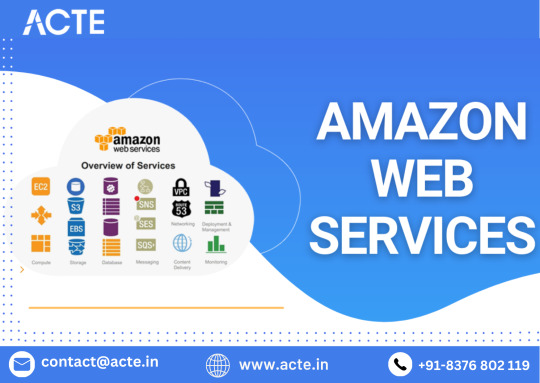
Harnessing Computational Agility with Amazon EC2
Central to the AWS ecosystem is Amazon EC2 (Elastic Compute Cloud), a pivotal player reshaping the cloud computing paradigm. Offering scalable virtual servers, EC2 empowers users to seamlessly run applications and manage computing resources. This adaptability enables businesses to dynamically adjust computational capacity, ensuring optimal performance and cost-effectiveness.
Redefining Storage Solutions
AWS addresses the critical need for scalable and secure storage through services such as Amazon S3 (Simple Storage Service) and Amazon EBS (Elastic Block Store). S3 acts as a dependable object storage solution for data backup, archiving, and content distribution. Meanwhile, EBS provides persistent block-level storage designed for EC2 instances, guaranteeing data integrity and accessibility.
Streamlined Database Management: Amazon RDS and DynamoDB
Database management undergoes a transformation with Amazon RDS, simplifying the setup, operation, and scaling of relational databases. Be it MySQL, PostgreSQL, or SQL Server, RDS provides a frictionless environment for managing diverse database workloads. For enthusiasts of NoSQL, Amazon DynamoDB steps in as a swift and flexible solution for document and key-value data storage.
Networking Mastery: Amazon VPC and Route 53
AWS empowers users to construct a virtual sanctuary for their resources through Amazon VPC (Virtual Private Cloud). This virtual network facilitates the launch of AWS resources within a user-defined space, enhancing security and control. Simultaneously, Amazon Route 53, a scalable DNS web service, ensures seamless routing of end-user requests to globally distributed endpoints.
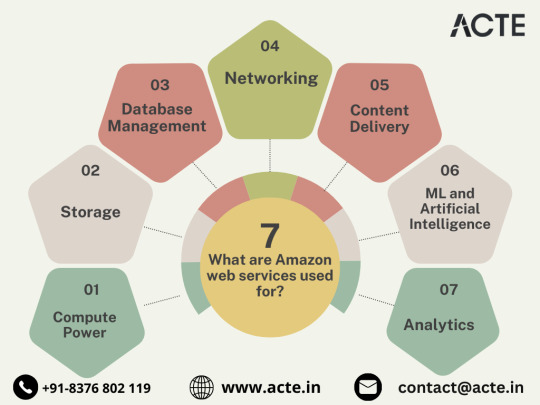
Global Content Delivery Excellence with Amazon CloudFront
Amazon CloudFront emerges as a dynamic content delivery network (CDN) service, securely delivering data, videos, applications, and APIs on a global scale. This ensures low latency and high transfer speeds, elevating user experiences across diverse geographical locations.
AI and ML Prowess Unleashed
AWS propels businesses into the future with advanced machine learning and artificial intelligence services. Amazon SageMaker, a fully managed service, enables developers to rapidly build, train, and deploy machine learning models. Additionally, Amazon Rekognition provides sophisticated image and video analysis, supporting applications in facial recognition, object detection, and content moderation.
Big Data Mastery: Amazon Redshift and Athena
For organizations grappling with massive datasets, AWS offers Amazon Redshift, a fully managed data warehouse service. It facilitates the execution of complex queries on large datasets, empowering informed decision-making. Simultaneously, Amazon Athena allows users to analyze data in Amazon S3 using standard SQL queries, unlocking invaluable insights.
In conclusion, Amazon Web Services (AWS) stands as an all-encompassing cloud computing platform, empowering businesses to innovate, scale, and optimize operations. From adaptable compute power and secure storage solutions to cutting-edge AI and ML capabilities, AWS serves as a robust foundation for organizations navigating the digital frontier. Embrace the limitless potential of cloud computing with AWS – where innovation knows no bounds.
3 notes
·
View notes
Text
AWS Training Course: Cloud Skills That Actually Stick

Why Ascendient Learning? We train cloud professionals, not just exam-takers. If you’re here to advance in AWS, our AWS courses are here to make it happen.
0 notes
Text
Kickstart Your Cloud Journey with AWS Certification at Kodestree!
Ready to build a high-paying cloud career? 🚀 Join Kodestree’s AWS Certification Course and get hands-on training from industry experts. Whether you're a beginner or looking to upgrade your skills, our AWS course helps you gain real-world experience and global certification. Start your cloud journey today with Kodestree – where quality meets career growth! ☁️💼

0 notes
Text
The Power of Amazon Web Services (AWS): A Detailed Guide for 2025
Amazon Web Services (AWS) is the leading cloud computing platform, providing a wide range of services that empower businesses to grow, innovate, and optimize operations efficiently. With an increasing demand for cloud-based solutions, AWS has become the backbone of modern enterprises, offering high-performance computing, storage, networking, and security solutions. Whether you are an IT professional, a business owner, or an aspiring cloud architect, understanding AWS can give you a competitive edge in the technology landscape.
In this blog we will guide and explore AWS fundamentals, key services, benefits, use cases, and future trends, helping you navigate the AWS ecosystem with confidence.
What is AWS?
Amazon Web Services (AWS) is a secure cloud computing platform that provides on-demand computing resources, storage, databases, machine learning, and networking solutions. AWS eliminates the need for physical infrastructure, enabling businesses to run applications and services seamlessly in a cost-effective manner.
With over 200 fully featured services, AWS powers startups, enterprises, and government organizations worldwide. Its flexibility, scalability, and pay-as-you-go pricing model make it a preferred choice for cloud adoption.
Key AWS Services You Must Know
AWS offers a vast range of services, categorized into various domains. Below are some essential AWS services that are widely used:
1. Compute Services
Amazon EC2 (Elastic Compute Cloud): Provides resizable virtual servers for running applications.
AWS Lambda: Enables serverless computing, allowing you to run code without provisioning or managing servers.
Amazon Lightsail: A simple virtual private server (VPS) for small applications and websites.
AWS Fargate: A serverless compute engine for containerized applications.
2. Storage Services
Amazon S3 (Simple Storage Service): Object storage solution for scalable data storage.
Amazon EBS (Elastic Block Store): Persistent block storage for EC2 instances.
Amazon Glacier: Low-cost archival storage for long-term data backup.
3. Database Services
Amazon RDS (Relational Database Service): Fully managed relational databases like MySQL, PostgreSQL, and SQL Server.
Amazon DynamoDB: NoSQL database for key-value and document storage.
Amazon Redshift: Data warehousing service for big data analytics.
4. Networking and Content Delivery
Amazon VPC (Virtual Private Cloud): Provides a secure and isolated network in AWS.
Amazon Route 53: Scalable domain name system (DNS) service.
AWS CloudFront: Content delivery network (CDN) for fast and secure content delivery.
5. Security and Identity Management
AWS IAM (Identity and Access Management): Provides secure access control to AWS resources.
AWS Shield: DDoS protection for applications.
AWS WAF (Web Application Firewall): Protects applications from web threats.
6. Machine Learning & AI
Amazon SageMaker: Builds, trains, and deploys machine learning models.
Amazon Rekognition: Image and video analysis using AI.
Amazon Polly: Converts text into speech using deep learning.
Benefits of Using AWS
1. Scalability and Flexibility
AWS enables businesses to scale their infrastructure dynamically, ensuring seamless performance even during peak demand periods.
2. Cost-Effectiveness
With AWS's pay-as-you-go pricing, businesses only pay for the resources they use, reducing unnecessary expenses.
3. High Availability and Reliability
AWS operates in multiple regions and availability zones, ensuring minimal downtime and high data redundancy.
4. Enhanced Security
AWS offers advanced security features, including encryption, identity management, and compliance tools, ensuring data protection.
5. Fast Deployment
With AWS, businesses can deploy applications quickly, reducing time-to-market and accelerating innovation.
Popular Use Cases of AWS
1. Web Hosting
AWS is widely used for hosting websites and applications with services like EC2, S3, and CloudFront.
2. Big Data Analytics
Enterprises leverage AWS services like Redshift and AWS Glue for data warehousing and ETL processes.
3. DevOps and CI/CD
AWS supports DevOps practices with services like AWS CodePipeline, CodeBuild, and CodeDeploy.
4. Machine Learning and AI
Organizations use AWS AI services like SageMaker for building intelligent applications.
5. IoT Applications
AWS IoT Core enables businesses to connect and manage IoT devices securely.
Future Trends in AWS and Cloud Computing
1. Serverless Computing Expansion
More businesses are adopting AWS Lambda and Fargate for running applications without managing servers.
2. Multi-Cloud and Hybrid Cloud Adoption
AWS Outposts and AWS Hybrid Cloud solutions are bridging the gap between on-premise and cloud environments.
3. AI and Machine Learning Growth
AWS continues to enhance AI capabilities, driving innovation in automation and data processing.
4. Edge Computing Development
AWS Wavelength and AWS Local Zones will expand the reach of cloud computing to edge devices.
Conclusion
Amazon Web Services (AWS) is transforming how businesses operate in the digital era, providing unmatched scalability, security, and performance. Whether you are an enterprise looking to migrate to the cloud, a developer building applications, or a data scientist leveraging AI, AWS has a solution to your needs.
By mastering AWS, you can explore new career opportunities and drive business innovation. Start your AWS journey today and explore the limitless possibilities of cloud computing.
0 notes
Text
Exploring the Power of Amazon Web Services: Top AWS Services You Need to Know
In the ever-evolving realm of cloud computing, Amazon Web Services (AWS) has established itself as an undeniable force to be reckoned with. AWS's vast and diverse array of services has positioned it as a dominant player, catering to the evolving needs of businesses, startups, and individuals worldwide. Its popularity transcends boundaries, making it the preferred choice for a myriad of use cases, from startups launching their first web applications to established enterprises managing complex networks of services. This blog embarks on an exploratory journey into the boundless world of AWS, delving deep into some of its most sought-after and pivotal services.

As the digital landscape continues to expand, understanding these AWS services and their significance is pivotal, whether you're a seasoned cloud expert or someone taking the first steps in your cloud computing journey. Join us as we delve into the intricate web of AWS's top services and discover how they can shape the future of your cloud computing endeavors. From cloud novices to seasoned professionals, the AWS ecosystem holds the keys to innovation and transformation.
Amazon EC2 (Elastic Compute Cloud): The Foundation of Scalability At the core of AWS's capabilities is Amazon EC2, the Elastic Compute Cloud. EC2 provides resizable compute capacity in the cloud, allowing you to run virtual servers, commonly referred to as instances. These instances serve as the foundation for a multitude of AWS solutions, offering the scalability and flexibility required to meet diverse application and workload demands. Whether you're a startup launching your first web application or an enterprise managing a complex network of services, EC2 ensures that you have the computational resources you need, precisely when you need them.
Amazon S3 (Simple Storage Service): Secure, Scalable, and Cost-Effective Data Storage When it comes to storing and retrieving data, Amazon S3, the Simple Storage Service, stands as an indispensable tool in the AWS arsenal. S3 offers a scalable and highly durable object storage service that is designed for data security and cost-effectiveness. This service is the choice of businesses and individuals for storing a wide range of data, including media files, backups, and data archives. Its flexibility and reliability make it a prime choice for safeguarding your digital assets and ensuring they are readily accessible.
Amazon RDS (Relational Database Service): Streamlined Database Management Database management can be a complex task, but AWS simplifies it with Amazon RDS, the Relational Database Service. RDS automates many common database management tasks, including patching, backups, and scaling. It supports multiple database engines, including popular options like MySQL, PostgreSQL, and SQL Server. This service allows you to focus on your application while AWS handles the underlying database infrastructure. Whether you're building a content management system, an e-commerce platform, or a mobile app, RDS streamlines your database operations.
AWS Lambda: The Era of Serverless Computing Serverless computing has transformed the way applications are built and deployed, and AWS Lambda is at the forefront of this revolution. Lambda is a serverless compute service that enables you to run code without the need for server provisioning or management. It's the perfect solution for building serverless applications, microservices, and automating tasks. The unique pricing model ensures that you pay only for the compute time your code actually uses. This service empowers developers to focus on coding, knowing that AWS will handle the operational complexities behind the scenes.
Amazon DynamoDB: Low Latency, High Scalability NoSQL Database Amazon DynamoDB is a managed NoSQL database service that stands out for its low latency and exceptional scalability. It's a popular choice for applications with variable workloads, such as gaming platforms, IoT solutions, and real-time data processing systems. DynamoDB automatically scales to meet the demands of your applications, ensuring consistent, single-digit millisecond latency at any scale. Whether you're managing user profiles, session data, or real-time analytics, DynamoDB is designed to meet your performance needs.
Amazon VPC (Virtual Private Cloud): Tailored Networking for Security and Control Security and control over your cloud resources are paramount, and Amazon VPC (Virtual Private Cloud) empowers you to create isolated networks within the AWS cloud. This isolation enhances security and control, allowing you to define your network topology, configure routing, and manage access. VPC is the go-to solution for businesses and individuals who require a network environment that mirrors the security and control of traditional on-premises data centers.
Amazon SNS (Simple Notification Service): Seamless Communication Across Channels Effective communication is a cornerstone of modern applications, and Amazon SNS (Simple Notification Service) is designed to facilitate seamless communication across various channels. This fully managed messaging service enables you to send notifications to a distributed set of recipients, whether through email, SMS, or mobile devices. SNS is an essential component of applications that require real-time updates and notifications to keep users informed and engaged.
Amazon SQS (Simple Queue Service): Decoupling for Scalable Applications Decoupling components of a cloud application is crucial for scalability, and Amazon SQS (Simple Queue Service) is a fully managed message queuing service designed for this purpose. It ensures reliable and scalable communication between different parts of your application, helping you create systems that can handle varying workloads efficiently. SQS is a valuable tool for building robust, distributed applications that can adapt to changes in demand.
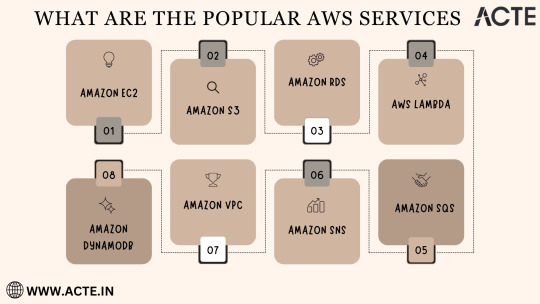
In the rapidly evolving landscape of cloud computing, Amazon Web Services (AWS) stands as a colossus, offering a diverse array of services that address the ever-evolving needs of businesses, startups, and individuals alike. AWS's popularity transcends industry boundaries, making it the go-to choice for a wide range of use cases, from startups launching their inaugural web applications to established enterprises managing intricate networks of services.
To unlock the full potential of these AWS services, gaining comprehensive knowledge and hands-on experience is key. ACTE Technologies, a renowned training provider, offers specialized AWS training programs designed to provide practical skills and in-depth understanding. These programs equip you with the tools needed to navigate and excel in the dynamic world of cloud computing.
With AWS services at your disposal, the possibilities are endless, and innovation knows no bounds. Join the ever-growing community of cloud professionals and enthusiasts, and empower yourself to shape the future of the digital landscape. ACTE Technologies is your trusted guide on this journey, providing the knowledge and support needed to thrive in the world of AWS and cloud computing.
8 notes
·
View notes
Text
We make extensive use of cloud computing services in our daily life. You’re employing cloud computing when you change your Facebook status. Once you use net banking, once more you are into the clouds. There are many more instances of cloud computing; Dropbox, Google Drive, Hubspot, There are great chances that you may rely on cloud computing to overcome problems your company faces.
0 notes
Text
Charting Your Tech Odyssey: The Compelling Case for AWS Mastery as a Beginner
Embarking on a journey into the tech realm as a beginner? Look no further than Amazon Web Services (AWS), a powerhouse in cloud computing that promises a multitude of advantages for those starting their technological adventure.

1. Navigating the Cloud Giants: AWS Industry Prowess: Dive into the expansive universe of AWS, the unrivaled leader in cloud services. With a commanding market share, AWS is the go-to choice for businesses of all sizes. For beginners, aligning with AWS means stepping into a realm with vast opportunities.
2. A Toolkit for Every Tech Explorer: AWS Versatility Unleashed: AWS isn't just a platform; it's a versatile toolkit. Covering computing, storage, databases, machine learning, and beyond, AWS equips beginners with a dynamic skill set applicable across various domains and roles.
3. Job Horizons and Career Ascents: AWS as the Gateway: The widespread adoption of AWS translates into a burgeoning demand for skilled professionals. Learning AWS isn't merely a skill; it's a gateway to diverse job opportunities, from foundational roles to specialized positions. The trajectory for career growth becomes promising in the ever-expanding cloud-centric landscape.
4. Resources Galore and Community Kinship: The AWS Learning Ecosystem: AWS provides a nourishing environment for learners. Extensive documentation, tutorials, and an engaged community create an ecosystem that caters to diverse learning styles. Whether you prefer solo exploration or community interaction, AWS has you covered.
5. Pioneering Exploration without Cost Concerns: AWS Free Tier Advantage: Hands-on experience is crucial, and AWS acknowledges this by offering a free tier. Beginners can explore and experiment with various services without worrying about costs. This practical exposure becomes invaluable in understanding how AWS services operate in real-world scenarios.

6. Certifications as Badges of Proficiency: AWS Recognition and Credibility: AWS certifications stand as globally recognized badges of proficiency. Earning these certifications enhances credibility in the job market, signaling expertise in designing, deploying, and managing cloud infrastructure. For beginners, this recognition can be a game-changer in securing sought-after roles.
7. Future-Proofing Skills in the Cloud Galaxy: AWS and Technology's Tomorrow: Cloud computing isn't just a trend; it's the beating heart of IT infrastructure. Learning AWS ensures that beginners' skills remain relevant and aligned with the unfolding technological landscape. AWS isn't just about today; it's a strategic investment for continuous learning and adaptability to emerging technologies.
In summary, the decision to delve into AWS as a beginner isn't just a choice; it's a strategic move. AWS unfolds a world of opportunities, from skill development to future-proofing. As technology evolves, AWS stands as a beacon, making it an essential investment for beginners venturing into the tech industry.
2 notes
·
View notes
Text

AWS Course: Master Cloud Skills with Ascendient Learning
AWS Course from Ascendient Learning is your gateway to mastering Amazon Web Services and launching a high-demand career. Learn core AWS services, cloud architecture, and deployment strategies from industry pros. Our hands-on training ensures you're ready for real-world applications. Don’t just learn—excel in the cloud. Choose Ascendient Learning for expert-led AWS training that transforms your future. Enroll now and start building
For more information visit: https://www.ascendientlearning.com/it-training/aws
0 notes
Text
The Role of an AWS Solutions Architect: Key Skills, Responsibilities, and Career Prospects
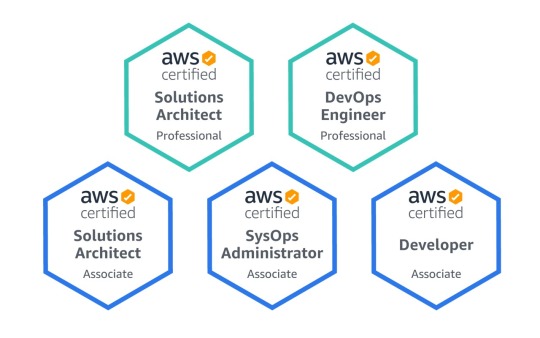
In today's modern digital world, the heart of the business operations lies in cloud computing. Among all the cloud platforms, the most widely accepted and versatile provider of cloud services is Amazon Web Services (AWS). As a result, there is a massive demand for cloud solution designers and managers. The role that has gained much importance is that of an AWS Solutions Architect.
What is an AWS Solutions Architect?
An AWS solutions architect is the professional designing, deploying, and managing applications and systems on the AWS platform. Such architects work with companies to identify needs and then utilize the AWS suite of services in order to create secure, scalable, and cost-effective solutions. This role thus demands a very good understanding of the services, best practices related to architecture, and the business or industry requirements being addressed.
Key Responsibilities of AWS Solution Architect
Designing such an effective cloud solution that ensures scalability and dependability is quite a big duty of designing cloud solutions in a remit defined by the term AWS solution architectures. Other ones include selection for the best suitability of services pertaining to companies into AWS, keeping security compliance over the system design, and constructing architecture with perfect performance at cheap cost.
Most of these consultants work directly with clients to understand their technical and business requirements. They work with various stakeholders to deliver, among others, guidance of technical nature to make deliveries that are aimed at customizing solutions to fit the business requirements.
Security and Compliance. Cloud computing places a high priority on security, and the AWS Solutions Architects ensure that their solution designs meet the requirements of industry standards and regulatory compliance. They use encryption, access controls, and network security protocols to secure systems and data.
Optimization and Cost Management: AWS services are flexible and come in various configurations. A cloud architect designing an AWS solution should optimize cloud resources for both performance and cost. This is achieved through choosing the correct pricing models, resource allocation management, and regular review of the architecture to determine the potential areas of improvement.
Troubleshooting and Support: An AWS Solutions Architect should be able to diagnose issues and provide ongoing support for cloud-based applications and systems. This includes monitoring system performance, identifying potential problems, and applying solutions as needed.
Essential Skills for an AWS Solutions Architect
Deep knowledge of various AWS services: An AWS Solutions Architect must be pretty well aware of each and every one of the differing AWS services. Such as EC2, S3, RDS, Lambda, VPC, and the likes. He must know how to combine those services to create comprehensive cloud solutions.
Architectural best practices: He has to be an expert in designing highly secure, scalable, and highly available cloud architecture. Familiarity with AWS Well-Architected Framework is a plus.
Security Expertise: Security happens to be an important consideration on the cloud. An AWS Solution Architect should, therefore, have a clue how to design secured infrastructures employing tools such as AWS Identity and Access Management, encryption, firewall, and other monitoring services.
Analytical and Problem-Solving Skills: For the reason that each cloud solution is unique in nature, Amazon Web Services solutions architects need a high degree of analytical and problem-solving skills, to develop tailored solutions for all their needs.
Communication Skills : An AWS Solutions Architect will always be in contact with various clients, developers and stakeholders. The ability to get the technical concept spoken in simple words is essential as well as business requirements to technical requirements.
Certifications for AWS Solutions Architects
A degree in computer science or related field is helpful but most of the time certifications are required to prove expertise. The AWS Certified Solutions Architect – Associate is a very popular certification for those in this role. This ensures the candidate can design distributed systems on AWS and solve complex problems while implementing AWS security best practices. In addition, there is an AWS Certified Solutions Architect – Professional level certification that is considered advanced and for the application of large-scale architectures.
Career Prospects and Salary Expectations
More businesses are shifting to the cloud and it is sure to increase more and more demand for AWS Solutions Architects. Reports have shown that an AWS Solutions Architect earns very competitive salaries with average salary being reported to be $120,000 to $150,000 for a solutions architect in the United States based on experience and location. Those professionals who hold a senior designation and specialized certification tend to draw a higher wage.
Secondly, the AWS Solutions Architects have better career prospects. They can reach senior technical roles, cloud engineering, and also lead in architecture roles in cloud architecture.
Conclusion
The emergent role of an AWS Solutions Architect becomes increasingly important with the adoption of the cloud in businesses. The role is responsible not only for designing and implementing a cloud-based solution but also with the responsibility of creating conditions that enable an organization to exploit the AWS platform fully. With the right skills, knowledge, and certifications, a career as an AWS Solutions Architect can be incredibly satisfying and rewarding.
0 notes
Text
Azure vs. AWS: A Detailed Comparison
Cloud computing has become the backbone of modern IT infrastructure, offering businesses scalability, security, and flexibility. Among the top cloud service providers, Microsoft Azure and Amazon Web Services (AWS) dominate the market, each bringing unique strengths. While AWS has held the position as a cloud pioneer, Azure has been gaining traction, especially among enterprises with existing Microsoft ecosystems. This article provides an in-depth comparison of Azure vs. AWS, covering aspects like database services, architecture, and data engineering capabilities to help businesses make an informed decision.
1. Market Presence and Adoption
AWS, launched in 2006, was the first major cloud provider and remains the market leader. It boasts a massive customer base, including startups, enterprises, and government organizations. Azure, introduced by Microsoft in 2010, has seen rapid growth, especially among enterprises leveraging Microsoft's ecosystem. Many companies using Microsoft products like Windows Server, SQL Server, and Office 365 find Azure a natural choice.
2. Cloud Architecture: Comparing Azure and AWS
Cloud architecture defines how cloud services integrate and support workloads. Both AWS and Azure provide robust cloud architectures but with different approaches.
AWS Cloud Architecture
AWS follows a modular approach, allowing users to pick and choose services based on their needs. It offers:
Amazon EC2 for scalable compute resources
Amazon VPC for network security and isolation
Amazon S3 for highly scalable object storage
AWS Lambda for serverless computing
Azure Cloud Architecture
Azure's architecture is designed to integrate seamlessly with Microsoft tools and services. It includes:
Azure Virtual Machines (VMs) for compute workloads
Azure Virtual Network (VNet) for networking and security
Azure Blob Storage for scalable object storage
Azure Functions for serverless computing
In terms of architecture, AWS provides more flexibility, while Azure ensures deep integration with enterprise IT environments.
3. Database Services: Azure SQL vs. AWS RDS
Database management is crucial for any cloud strategy. Both AWS and Azure offer extensive database solutions, but they cater to different needs.
AWS Database Services
AWS provides a wide range of managed database services, including:
Amazon RDS (Relational Database Service) – Supports MySQL, PostgreSQL, SQL Server, MariaDB, and Oracle.
Amazon Aurora – High-performance relational database compatible with MySQL and PostgreSQL.
Amazon DynamoDB – NoSQL database for low-latency applications.
Amazon Redshift – Data warehousing for big data analytics.
Azure Database Services
Azure offers strong database services, especially for Microsoft-centric workloads:
Azure SQL Database – Fully managed SQL database optimized for Microsoft applications.
Cosmos DB – Globally distributed, multi-model NoSQL database.
Azure Synapse Analytics – Enterprise-scale data warehousing.
Azure Database for PostgreSQL/MySQL/MariaDB – Open-source relational databases with managed services.
AWS provides a more mature and diverse database portfolio, while Azure stands out in SQL-based workloads and seamless Microsoft integration.
4. Data Engineering and Analytics: Which Cloud is Better?
Data engineering is a critical function that ensures efficient data processing, transformation, and storage. Both AWS and Azure offer data engineering tools, but their capabilities differ.
AWS Data Engineering Tools
AWS Glue – Serverless data integration service for ETL workloads.
Amazon Kinesis – Real-time data streaming.
AWS Data Pipeline – Orchestration of data workflows.
Amazon EMR (Elastic MapReduce) – Managed Hadoop, Spark, and Presto.
Azure Data Engineering Tools
Azure Data Factory – Cloud-based ETL and data integration.
Azure Stream Analytics – Real-time event processing.
Azure Databricks – Managed Apache Spark for big data processing.
Azure HDInsight – Fully managed Hadoop and Spark services.
Azure has an edge in data engineering for enterprises leveraging AI and machine learning via Azure Machine Learning and Databricks. AWS, however, excels in scalable and mature big data tools.
5. Pricing Models and Cost Efficiency
Cloud pricing is a major factor when selecting a provider. Both AWS and Azure offer pay-as-you-go pricing, reserved instances, and cost optimization tools.
AWS Pricing: Charges are based on compute, storage, data transfer, and additional services. AWS also offers AWS Savings Plans for cost reductions.
Azure Pricing: Azure provides cost-effective solutions for Microsoft-centric businesses. Azure Hybrid Benefit allows companies to use existing Windows Server and SQL Server licenses to save costs.
AWS generally provides more pricing transparency, while Azure offers better pricing for Microsoft users.
6. Security and Compliance
Security is a top priority in cloud computing, and both AWS and Azure provide strong security measures.
AWS Security: Uses AWS IAM (Identity and Access Management), AWS Shield (DDoS protection), and AWS Key Management Service.
Azure Security: Provides Azure Active Directory (AAD), Azure Security Center, and built-in compliance features for enterprises.
Both platforms meet industry standards like GDPR, HIPAA, and ISO 27001, making them secure choices for businesses.
7. Hybrid Cloud Capabilities
Enterprises increasingly prefer hybrid cloud strategies. Here, Azure has a significant advantage due to its Azure Arc and Azure Stack technologies that extend cloud services to on-premises environments.
AWS offers AWS Outposts, but it is not as deeply integrated as Azure’s hybrid solutions.
8. Which Cloud Should You Choose?
Choose AWS if:
You need a diverse range of cloud services.
You require highly scalable and mature cloud solutions.
Your business prioritizes flexibility and a global cloud footprint.
Choose Azure if:
Your business relies heavily on Microsoft products.
You need strong hybrid cloud capabilities.
Your focus is on SQL-based workloads and enterprise data engineering.
Conclusion
Both AWS and Azure are powerful cloud providers with unique strengths. AWS remains the leader in cloud services, flexibility, and scalability, while Azure is the go-to choice for enterprises using Microsoft’s ecosystem.
Ultimately, the right choice depends on your organization’s needs in terms of database management, cloud architecture, data engineering, and overall IT strategy. Companies looking for a seamless Microsoft integration should opt for Azure, while businesses seeking a highly scalable and service-rich cloud should consider AWS.
Regardless of your choice, both platforms provide the foundation for a strong, scalable, and secure cloud infrastructure in today’s data-driven world.
0 notes
Text
Journey to AWS Proficiency: Unveiling Core Services and Certification Paths
Amazon Web Services, often referred to as AWS, stands at the forefront of cloud technology and has revolutionized the way businesses and individuals leverage the power of the cloud. This blog serves as your comprehensive guide to understanding AWS, exploring its core services, and learning how to master this dynamic platform. From the fundamentals of cloud computing to the hands-on experience of AWS services, we'll cover it all. Additionally, we'll discuss the role of education and training, specifically highlighting the value of ACTE Technologies in nurturing your AWS skills, concluding with a mention of their AWS courses.

The Journey to AWS Proficiency:
1. Basics of Cloud Computing:
Getting Started: Before diving into AWS, it's crucial to understand the fundamentals of cloud computing. Begin by exploring the three primary service models: Infrastructure as a Service (IaaS), Platform as a Service (PaaS), and Software as a Service (SaaS). Gain a clear understanding of what cloud computing is and how it's transforming the IT landscape.
Key Concepts: Delve into the key concepts and advantages of cloud computing, such as scalability, flexibility, cost-effectiveness, and disaster recovery. Simultaneously, explore the potential challenges and drawbacks to get a comprehensive view of cloud technology.
2. AWS Core Services:
Elastic Compute Cloud (EC2): Start your AWS journey with Amazon EC2, which provides resizable compute capacity in the cloud. Learn how to create virtual servers, known as instances, and configure them to your specifications. Gain an understanding of the different instance types and how to deploy applications on EC2.
Simple Storage Service (S3): Explore Amazon S3, a secure and scalable storage service. Discover how to create buckets to store data and objects, configure permissions, and access data using a web interface or APIs.
Relational Database Service (RDS): Understand the importance of databases in cloud applications. Amazon RDS simplifies database management and maintenance. Learn how to set up, manage, and optimize RDS instances for your applications. Dive into database engines like MySQL, PostgreSQL, and more.
3. AWS Certification:
Certification Paths: AWS offers a range of certifications for cloud professionals, from foundational to professional levels. Consider enrolling in certification courses to validate your knowledge and expertise in AWS. AWS Certified Cloud Practitioner, AWS Certified Solutions Architect, and AWS Certified DevOps Engineer are some of the popular certifications to pursue.
Preparation: To prepare for AWS certifications, explore recommended study materials, practice exams, and official AWS training. ACTE Technologies, a reputable training institution, offers AWS certification training programs that can boost your confidence and readiness for the exams.
4. Hands-on Experience:
AWS Free Tier: Register for an AWS account and take advantage of the AWS Free Tier, which offers limited free access to various AWS services for 12 months. Practice creating instances, setting up S3 buckets, and exploring other services within the free tier. This hands-on experience is invaluable in gaining practical skills.
5. Online Courses and Tutorials:
Learning Platforms: Explore online learning platforms like Coursera, edX, Udemy, and LinkedIn Learning. These platforms offer a wide range of AWS courses taught by industry experts. They cover various AWS services, architecture, security, and best practices.
Official AWS Resources: AWS provides extensive online documentation, whitepapers, and tutorials. Their website is a goldmine of information for those looking to learn more about specific AWS services and how to use them effectively.
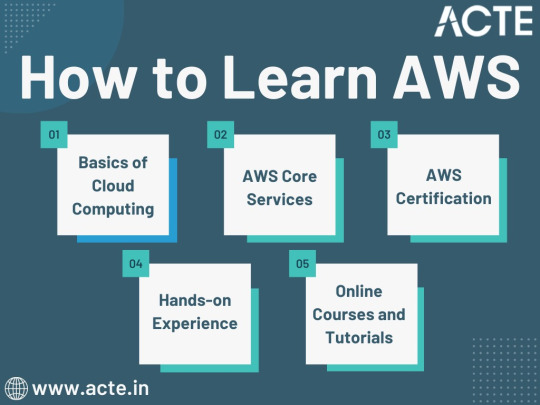
Amazon Web Services (AWS) represents an exciting frontier in the realm of cloud computing. As businesses and individuals increasingly rely on the cloud for innovation and scalability, AWS stands as a pivotal platform. The journey to AWS proficiency involves grasping fundamental cloud concepts, exploring core services, obtaining certifications, and acquiring practical experience. To expedite this process, online courses, tutorials, and structured training from renowned institutions like ACTE Technologies can be invaluable. ACTE Technologies' comprehensive AWS training programs provide hands-on experience, making your quest to master AWS more efficient and positioning you for a successful career in cloud technology.
8 notes
·
View notes